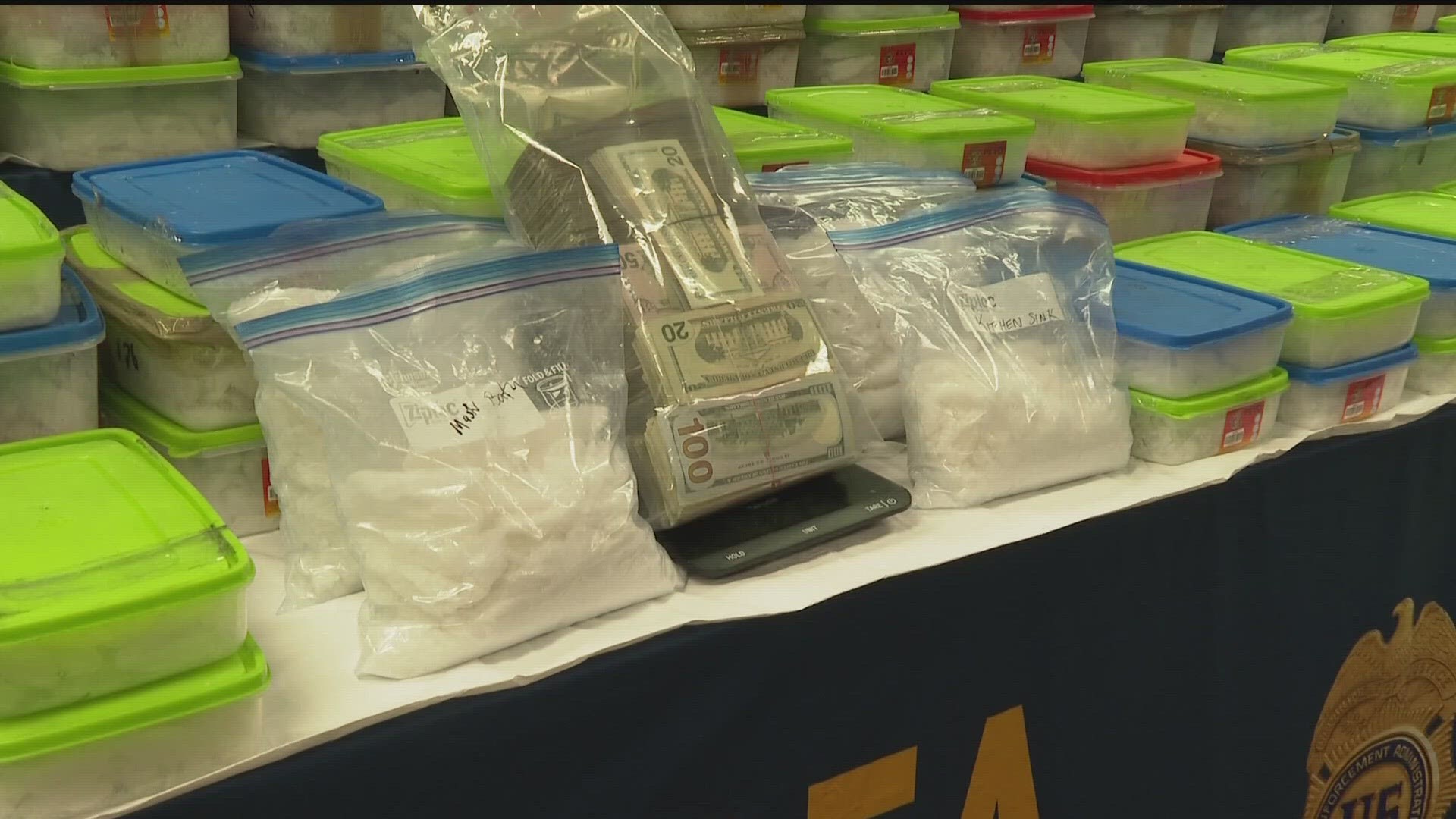ATLANTA — For those who know where to look, illegal drugs and the addiction that follows aren't hard to find.
In Atlanta, like in every major U.S. city, it's an open secret.
"It's a disease just like cancer," said recovery advocate Jeff Breedlove. "It does not discriminate."
Recent drug interdiction operations conducted by the federal Drug Enforcement Administration (DEA) give a glimpse at the scale of the problem.
Law enforcement officers seized roughly 370 kilograms of meth in Stone Mountain last week, the DEA announced. Around 400 kilos of meth were taken in an operation in Norcross last month.
"Unfortunately, it's become very routine," said DEA Atlanta Division Special Agent in Charge Robert Murphy at a press conference announcing the seizure.
Another operation tracked close to 1,100 kilos of cocaine — worth roughly $15 million — through metro Atlanta as part of a multistate drug trafficking organization, an agency spokesman confirmed.
Murphy said the scope of the operation was noteworthy, "but more importantly was the violence."
Nine people were ultimately indicted in that case in late 2023.
Still — illegal drugs are nothing new.
But according to Murphy, where many shipments are now coming from might be a surprise.
Cartels based in Latin America are now playing a key role in the drug trade to and through Atlanta, the DEA leader said.
"Really the only two that primarily impact Atlanta right now are the Sinaloa and the CJNG," said Murphy. "And DEA is hyper-focused on those two largest cartels."
Those cartels are drawn to Atlanta for many of the same reasons many other newcomers are: ease of travel and a central location in the nation's infrastructure system.
"The highways — you can go up the East coast, you can go out to the Midwest, you can go everywhere," said Murphy. "We have the highway system that makes it easy."
That ease of movement makes Atlanta an attractive location for drug distribution.
"The drugs come through here are stockpiled, and then they're shipped all over the U.S.," said Murphy. "The money comes back and is stockpiled and is shipped down south."
For drug cartels, Murphy said, Atlanta is effectively "a warehouse."
And a major one.
The DEA leader estimated that Atlanta has now joined Chicago and Los Angeles as one of the top distribution hubs for cartel drugs in America.
When asked if Atlanta was now one of the top three distribution points for the Sinaloa Cartel in the U.S., Murphy's answer was succinct: "Absolutely. No doubt about it."
With that flow of drugs comes the powerful synthetic opioid: fentanyl.
"When you and I grew up, you could experiment, and you didn't have to worry about it being a fatal decision," said Murphy. It's fatal now."
"It is a deadly game-changer," Breedlove agreed. "It has made things exponentially worse."
Breedlove understands better than most after spending years in active addiction.
"As much as I lied to my spouse and my son and my employers and my friends, I lied to myself the most," he said.
An arrest at a Dekalb County motel, he said, changed his life. Despite costing him his job, the event set his life on a new path.
"Here's what I want you to know: addiction is very real, and it's very deadly," said Breedlove. "But recovery is real, too."
He's been in recovery for over seven years and now advocates to help others walk the same path through his role as chief policy advisor at the Georgia Council for Recovery.
Looking at the influx of fentanyl into the supply of street drugs, he says he's grateful the synthetic opioid wasn't ubiquitous when he was still in active addiction.
"I'm very blessed to be alive," he said.
Breedlove's survival and recovery is a success story the DEA hopes to support by limiting the flow of illegal drugs.
"I can’t even imagine what the streets would look like if we weren’t out there doing what we’re doing and preventing them and not making this into the wild, wild west," said Murphy.
Breedlove agrees that traffickers must face criminal penalties.
He also urged political and law enforcement leaders to adopt policies that give street-level officers options when dealing with someone in active addiction — opening the door to allowing officers to divert some people to treatment resources instead of criminal charges.
"We do have that, thanks to House Bill 1013," said Breedlove. "What must change now is that we get proper training and get every police department and every sheriff's department caught up that there are other alternatives to immediately arresting a person when a front-line officer encounters them."
For anyone battling addiction, Breedlove says recovery is always possible.
"I hope that somebody watching this who's in active addiction wondering if it's real will look and say 'if some guy from Dekalb County, Georgia, from Ellenwood, Georgia, can go from active addiction to recovery, so can I,'" said Breedlove.
Addiction recovery resources
For those looking for resources, Breedlove says his organization – the Georgia Council for Recovery operates a hotline seven days a week.
You can call or text the CARES Warm Line at 1-844-326-5400.

